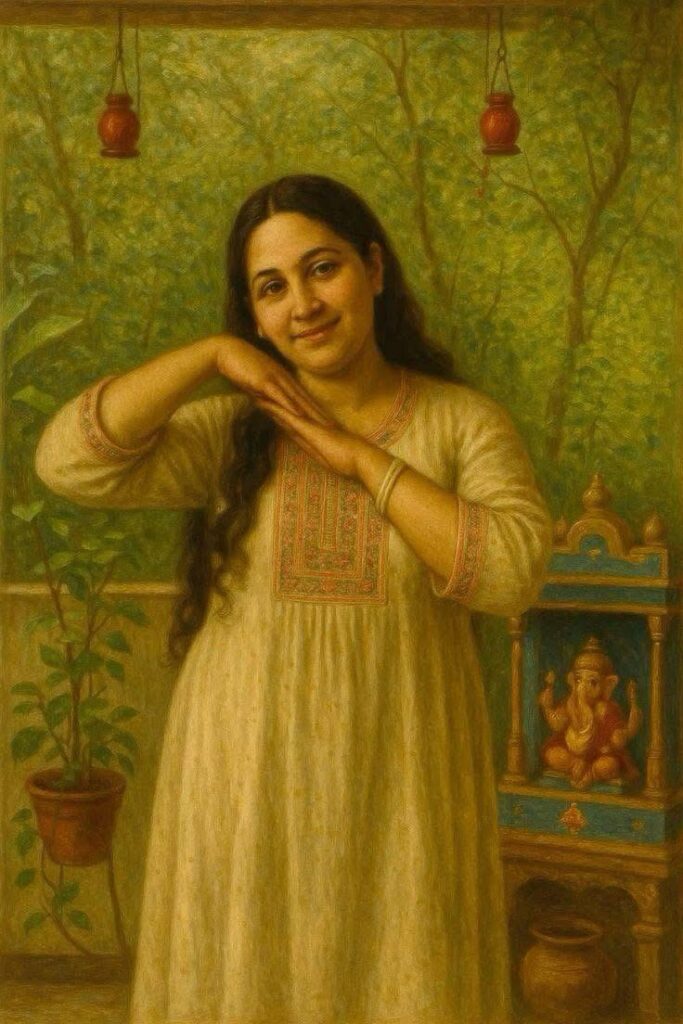The Value of Humility
By Lokanath Mishra
Retired Principal Swasti Das had just moved into her new luxury house in a posh residential colony in Bhubaneswar. As a renowned classical dancer and accomplished academic, Swasti beamed with pride, having finally achieved her dream of owning a home. Unmarried and living alone, her parents had passed away long ago, and her siblings had settled abroad.

Every evening, Swasti would take a stroll in the colony park, but she never bothered to acknowledge anyone. She thought to herself, “These people aren’t on my level!” One day, while sitting on a bench, an elderly woman, Sunanda Rath, approached her and started a conversation. Swasti barely paid attention, dominating the conversation with tales of her former glory and about the award she won in classical dance.

This pattern continued for several days, with Sunanda listening attentively without reacting. Finally, one day, Sunanda spoke up:
“Listen, Swasti… A fruit is valuable only as long as it is fresh and undamaged. Once it is damaged, its value doesn’t matter – it’s just a waste. I’ve lived here for five years, but I’ve never mentioned that I was an IAS officer, retired as Additional Chief Secretary, and my husband was a former Secretary in the Central Government.”

Swasti’s expression changed as she listened to Sunanda’s words. Sunanda continued, “The woman sitting to your right, Sasmita, was a General Manager in a reputed bank, and her husband was a top executive in a Public Sector company. The lady chatting across from us, Sabita, was a celebrated author, and her husband was a renowned scientist. And the lady quietly sitting in the corner, Sudhira, was a distinguished judge in the High Court, and her husband was a DGP. Yet none of them ever mention these things.”
Sunanda’s point was simple: “All of us here are like wasted fruits. Our past achievements and positions don’t matter now. We’re all the same.” Swasti realized that Sunanda was right. The positions, prestige, and power we once held are temporary. One day, all of it will be gone.

In the end, it doesn’t matter how many certificates, medals, or awards one has earned. Everyone ends up in the burial ground. Up to the burial ground, your friends, relatives, well-wishers, and pets will accompany you, and after the burial of your body, all, including your pet dog, will return, except your shadow, which will be buried along with the body. Thereafter, your soul will go alone and will get results as per your work, the Karma.
Swasti’s perspective shifted, and she began to see the world in a new light. She realized that true fulfillment comes not from external validation but from living a life of purpose and kindness. From that day on, Swasti made a conscious effort to connect with others in the colony, and she found joy in the simple things in life.
Swasti’s life was forever changed after her encounter with Sunanda. She realized that her pride and self-importance had blinded her to the struggles of others. As she began to see the world in a new light, she started to focus on kindness and compassion. One day, she started talking to Nisha, a tribal woman who worked as a maid in her house. Nisha shared her life story with Swasti, and it was a tale of struggle, loss, and redemption.

Nisha told Swasti that she was first married to Ranjan, the owner of a tea shop. They lived comfortably, and Nisha was happy with her life. However, one day, a beggar came to their door, asking for food. Ranjan refused to help, and Nisha regretted not being able to persuade him to show compassion. She felt that they had enough food to spare, and it would have been a kind gesture to help the beggar. Soon after, Ranjan’s tea shop was destroyed in a fire, and he left Nisha without a word. Nisha was devastated and went to her father’s house, where she stayed for four years, hoping that Ranjan would return.

When Ranjan didn’t return, Nisha’s parents arranged a second marriage for her with Rabi Singh, an auto driver. With Rabi, Nisha found a new sense of purpose, and she made it a point to cook lunch for three people every day, just in case someone in need came to their door. She had learned from her past experience and wanted to make sure that she never turned away someone in need.
One day, while they were eating lunch, a beggar knocked on the door. Nisha immediately went to help him, and as she gave him food, she realized that the beggar was none other than her first husband, Ranjan. Nisha was overcome with emotion, and Rabi, her current husband, showed remarkable kindness and understanding. In a surprising twist, Rabi revealed that he was the first beggar to whom Ranjan had refused to give food. This revelation added a new layer of depth to the story, highlighting the cyclical nature of karma.

Swasti was deeply moved by Nisha’s story, and it had a profound impact on her. She realized that true fulfillment comes from helping others and showing compassion. From that day on, Swasti started teaching classical dancing to the poor ladies of the neighborhood laborers’ community free of cost. She also offered them free food and clothes for their children. The richest ladies of her colony were inspired by her example and joined her in her efforts to make a positive difference in their community.

As Swasti continued to help those in need, she found joy and purpose in her life. She learned that true wealth is not measured by material possessions but by the positive impact we have on others. Swasti’s story serves as a reminder that kindness and compassion can transform lives and bring people together in meaningful ways. By showing empathy and understanding towards others, we can create a ripple effect of kindness that can have a profound impact on our communities.
